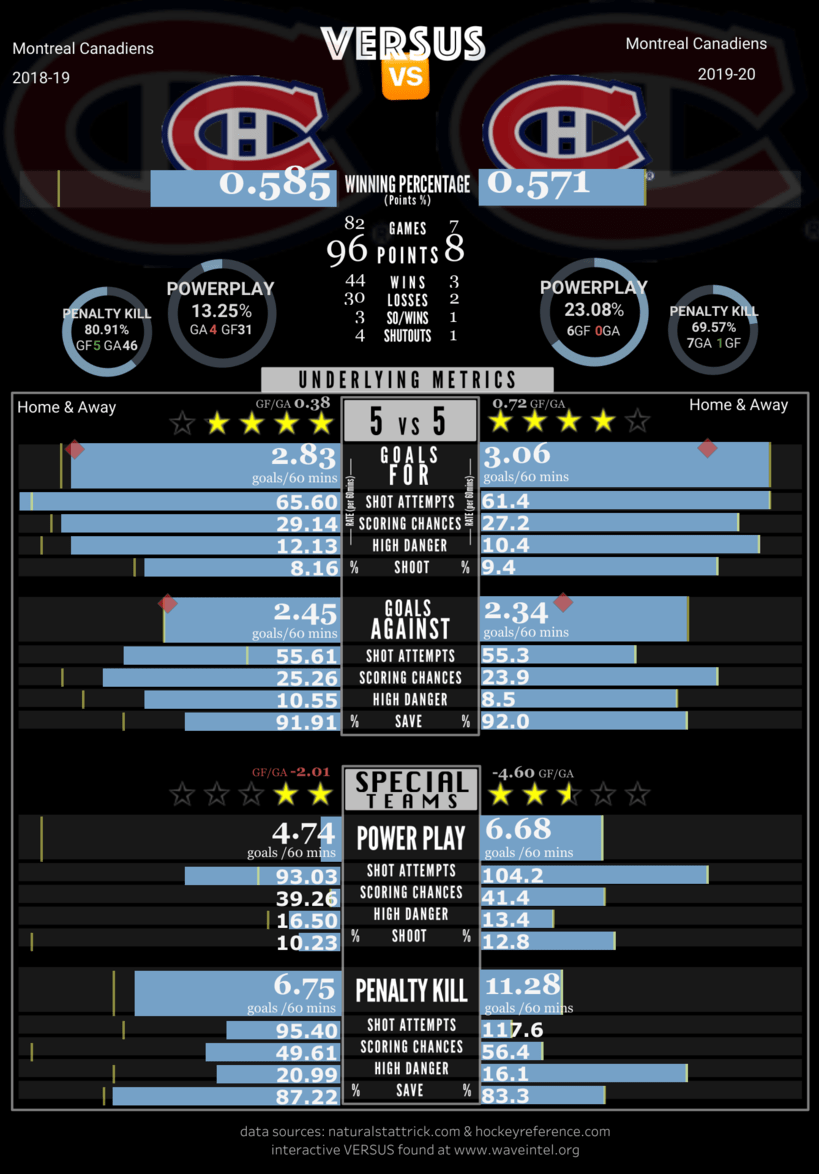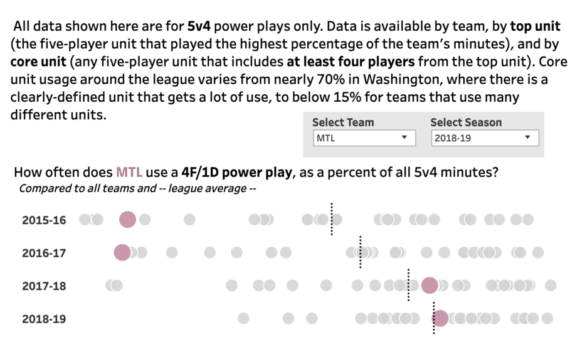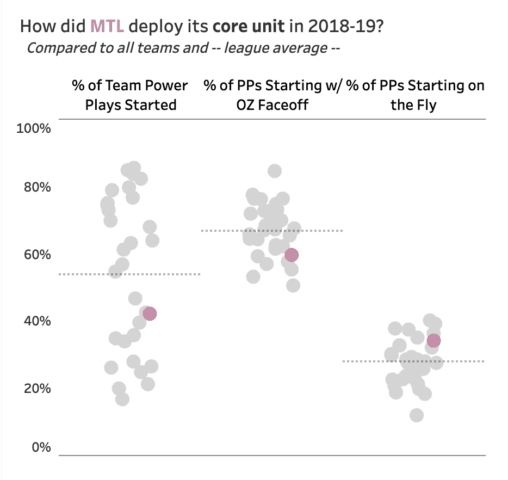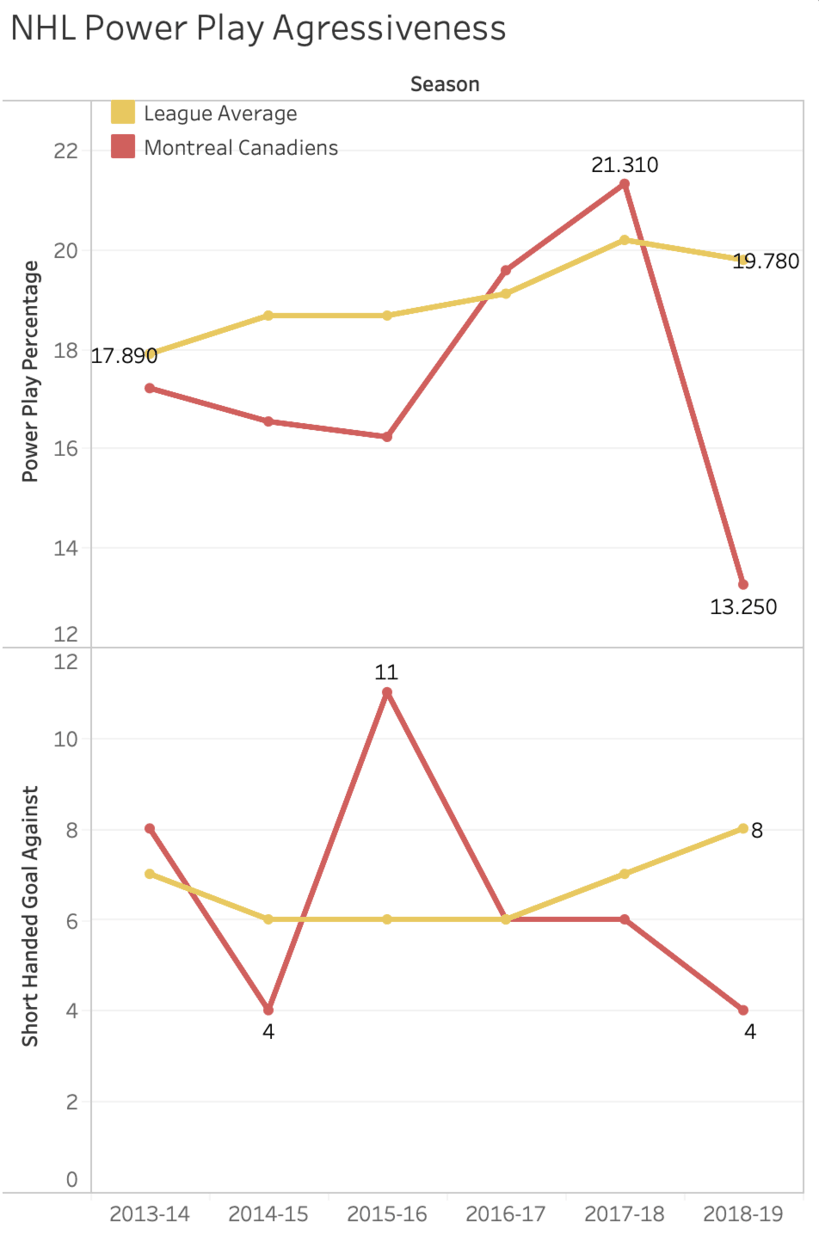Special teams are a very important aspect for any NHL team aspiring to make the playoffs. This is why the power play has been a hot topic for the Montreal Canadiens since having the dubious distinction of icing one of the worst power plays during the 2018-19 season.
To make matters worse, to start this season, the Canadiens penalty kill has bottomed-out, leaking goals at a 11.28 goals-per-60 min rate. Consider that last season their penalty kill rate was relatively average at 6.75, that’s almost two times better than this season’s edition. This ineffective penalty kill becomes even more concerning when the team has trouble staying out of the penalty box, as it has so far this season.
The penalty kill can be fixed with some adjustments and hard work. But the power play is a more delicate ecosystem. Let’s take a closer look at the underlying details of the Canadiens power play relative to the rest of the NHL.
What the Underlying Numbers Tell Us
The VERSUS Comparison Tool provides a comprehensive look at the team’s performance. The blue bar indicates league rank; the longer the bar, the better the team is performing in that category compared to all other NHL teams. The data at the beginning of the bar is the raw data for the category.

The left side of the chart shows the Canadiens’ 2018-19 performance, and the right side shows the current 2019-20 season. A look at the bottom section, Special Teams, shows the underlying power play numbers. While this season’s power play shot attempts (104.2 per 60 mins) ranks near the middle of the NHL, the rest of the underlying numbers (scoring chances, high-danger chances and shooting percentage) all rank below the league average. What’s more concerning is the high-danger chances generated (13.4 per 60 mins) are even lower than in the 2018-19 season (16.50 per 60 mins) when they ranked near the bottom of the NHL in that category.
In short, the Canadiens are just not generating enough quality scoring chances at the rate necessary to have success on the man advantage.
Player Deployment: More Forwards Please
We can use Meghan Hall’s research Power Plays in The NHL to understand how the Canadiens deploy players compared to the rest of the NHL.
The right side of the graphic shows the Canadiens deployed four forwards, one defenseman on the power play 72% and 74% of the time during the 2017-18 and 2018-19 seasons, respectively. This means they were slightly above average in this style of deployment in those years.

According to Hall’s research, the Canadiens core unit in the 2018-19 season was comprised of Brendan Gallagher, Jonathan Drouin, Max Domi, Tomas Tatar and Jeff Petry. As a unit, their time together (29.7% of all of the team’s power play time) ranked 21st in the NHL, which means head coach Claude Julien used more combinations than the average NHL team. Compare this to the Washington Capitals’ use of their top power play unit at 68.3%, which ranked number one in the NHL last season.
Of course, there is always context behind the numbers. For the Canadiens, the loss of Shea Weber for a significant portion of the season affects the usage numbers. Regardless, there is definitely some insight to be had here. If the divide between the skill (or production) level of the top players and middle players on a team is not evident, a coach will experiment and ‘juggle lines.’ It’s no surprise that most of the top NHL power plays boast units that remain together for a large percentage of their teams’ power play time. It’s a luxury that accompanies high skill, or at least a clear divide between a team’s top and middle players.
Get the Best Players on the Ice
Compared to other team’s core power play units, the Canadiens core unit of Gallagher, Drouin, Domi, Tatar and Petry was deployed at the start of a power play less frequently and deployed on-the-fly more frequently compared to other team’s top units.

Again, we can put some context here knowing that Phillip Danault, not part of the core unit, was taking many of these faceoffs, and using multiple players throughout the season will drop the overall usage numbers of the ‘core unit’. Nevertheless, the conclusion could be made that having to make these types of adjustments may have a net negative impact on overall power play performance.
Be as Aggressiveness as Possible
It seems that NHL tactics are becoming more aggressive. Whether it’s pulling the goalie earlier, or deploying more forwards on the power play than in the past. Stakes are high to score first, or to tie the game late in the final frame.
The power play has become more aggressive in style too. To illustrate this, the graph below shows the NHL average for shorthanded goals against has steadily increased over the years.

Many of the top NHL power plays are risky, and it shows in the number of shorthanded goals against, including the Boston Bruins (15 shorthanded goals against), Pittsburgh Penguins (15) and Florida Panthers (13), in the 2018-19 season.
The Canadiens, by comparison, have become increasingly conservative with fewer shorthanded goals against than the NHL average in the past two seasons, with six in the 2017-18 season, and only four in 2018-19, half the NHL average of eight.
How to Fix a Power-less Play
If I knew the answer to this, I’m sure I’d get a call from Canadiens general manager Marc Bergevin. What is the takeaway here? For me, a few things come to light. Firstly, that Julien doesn’t have the luxury of top-end scoring talent to just deploy his best players all the time. Any energy devoted to matchups and unit tinkering likely has a net loss of performance; but he really doesn’t have a choice. Secondly, the Canadiens seem to be inherently conservative. Does the spotlight shine too bright on errors, making players and coaches more conservative?
The information presented in this analysis illustrates the intense complexity behind the game of hockey. The numbers only beg more questions and provide fuel for fans to take a closer look at the team’s tactics.
What do you think about the Canadiens power play? Your comments are welcome.
Enjoy the game.